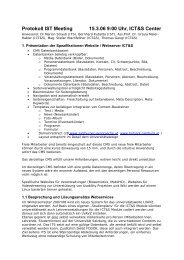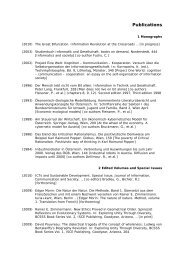CHRISTIAN FUCHS - ICT&S - Universität Salzburg
CHRISTIAN FUCHS - ICT&S - Universität Salzburg
CHRISTIAN FUCHS - ICT&S - Universität Salzburg
Create successful ePaper yourself
Turn your PDF publications into a flip-book with our unique Google optimized e-Paper software.
Christian Fuchs: Social Networking Sites and the Surveillance SocietystudiVZ Facebook MySpaceSelling and reusage of user content is allowedXTargeted personalized advertising is allowed X (opt out) X (no opt out) X (opt out)Sharing of data with third parties is allowed forX (no opt out) X (opt out)commercial aimsReception of advertising emails is allowed X (opt out) X XPassing on of data to the police for law enforcementor crime prevention102X X XTable 21. Rights guaranteed to corporations by terms of use and privacy policies onstudiVZ, Facebook, and MySpaceIn our study, the degree of general critical awareness of surveillance (surveillancecritique index) is significantly positively correlated with knowledge about studiVZ andcritical information behaviour on studiVZ. The degree of general critical awareness ofsurveillance and the degree of general knowledge about surveillance is significantlypositively correlated with the knowledge that students have about Facebook. This showsthat there tends to be a relationship between subjective surveillance parameters on theone hand and parameters that concern social networking sites on the other hand.Our data show that there is a large difference between the knowledge about andinformation behaviour on studiVZ on the one hand and Facebook and MySpace on theother hand. The students in our survey tend to be well informed about studiVZ and lesswell informed about Facebook and MySpace. Also they tend to opt out of advertisingon studiVZ, but not so much on Facebook and MySpace. This can be explained by thefact that when studiVZ changed its terms of use at the beginning of 2008, there was apublic discussion and an information campaign on studiVZ that to a certain degreecreated a negative public image of studiVZ as being the “SchnüffelVZ”(SniffleDirectory). The online information campaign did not attract a very large numberof users and did not make use of cyberprotest strategies such as online petitions. Thenew terms of use could not be circumvented by the information campaign, whichshows that corporate interests in most cases are more powerful than citizens’ interests.But the public and interpersonal discourse about studiVZ and surveillance seem to havecaused a concrete critical awareness of young users that led most of them to opt out ofpersonalized advertising and advertising information that is received by email and thestudiVZ message service. Facebook and MySpace are much less used, and discussed inAustria and Germany. This explains why users tend to know much less about theseplatforms and tend to behave rather uncritical on them. In the case of studiVZ,information about the changes in privacy, surveillance, and advertising that studiVZplanned by introducing new terms of use, seems to have activated the critical potentialof the students that is present in the form of a general critical attitude towardssurveillance so that a majority of students have actively taken steps to limit the amountand type of advertising they receive.Based on these findings, we recommend that critical citizens, critical citizens’initiatives, consumer groups, social movement groups, critical scholars, unions, dataprotection specialists/groups, consumer protection specialists/groups, criticalpoliticians, critical political parties observe closely the relationship of surveillance andcorporations and document instances where corporations and politicians take measuresthat threaten privacy or increase the surveillance of citizens. Such documentation is









